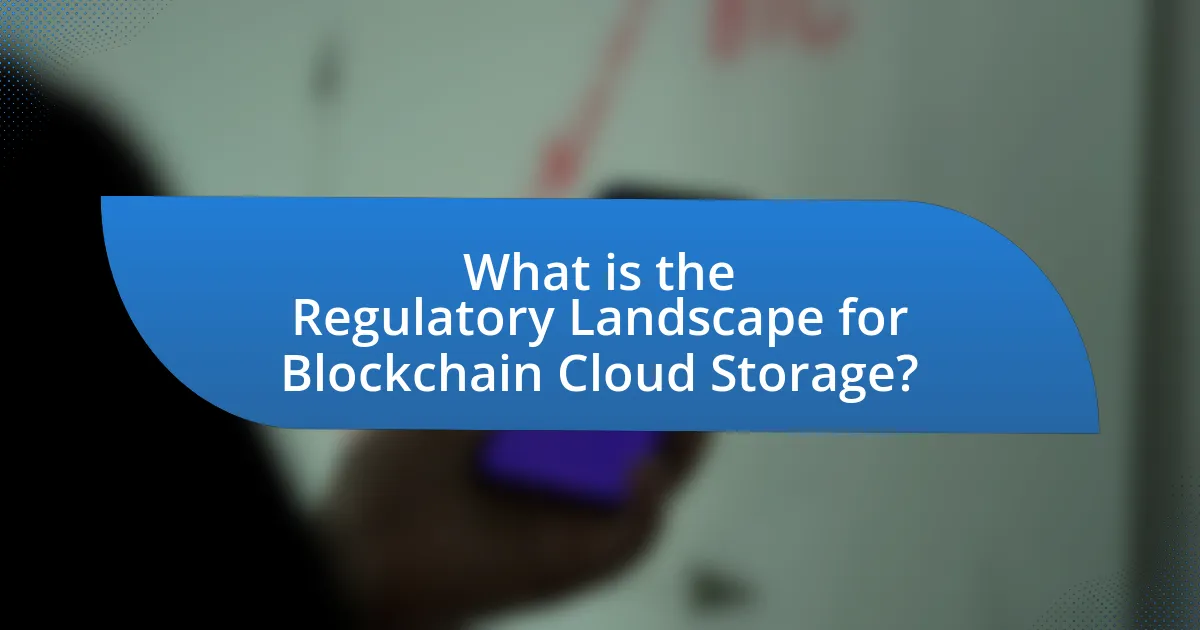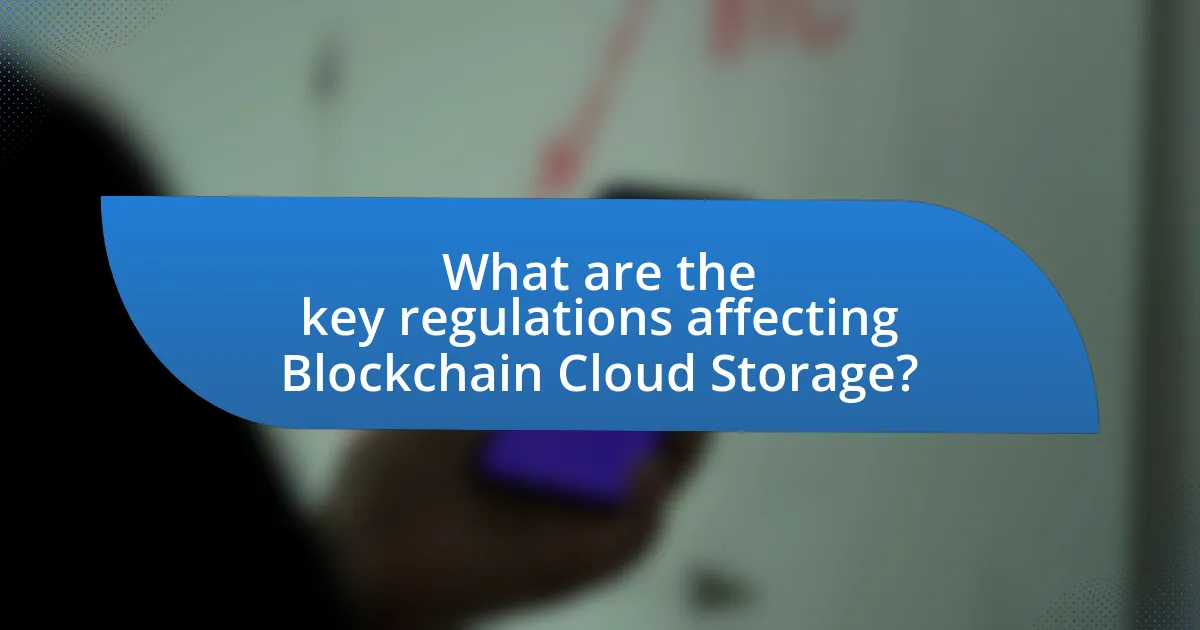The article focuses on the regulatory landscape for blockchain cloud storage, highlighting the complex interplay of data protection laws, financial regulations, and emerging blockchain-specific guidelines. It examines the impact of regulations such as the General Data Protection Regulation (GDPR) and the Financial Action Task Force (FATF) guidelines on compliance requirements for blockchain storage providers. Key features of blockchain technology, including decentralization and immutability, are discussed in relation to regulatory considerations, while the article also addresses the challenges businesses face in navigating compliance and the importance of understanding regulations to mitigate risks. Additionally, it outlines best practices for ensuring compliance, including regular audits and employee training, to enhance operational legitimacy and user trust.

What is the Regulatory Landscape for Blockchain Cloud Storage?
The regulatory landscape for blockchain cloud storage is characterized by a complex interplay of existing data protection laws, financial regulations, and emerging blockchain-specific guidelines. Various jurisdictions, including the European Union with its General Data Protection Regulation (GDPR), impose strict data privacy requirements that affect how blockchain cloud storage solutions manage personal data. Additionally, the Financial Action Task Force (FATF) has issued guidelines that impact blockchain technology, particularly concerning anti-money laundering (AML) and combating the financing of terrorism (CFT). These regulations necessitate that blockchain cloud storage providers implement robust compliance measures to ensure legal adherence while navigating the evolving regulatory environment.
How does blockchain technology influence cloud storage regulations?
Blockchain technology influences cloud storage regulations by enhancing data security, transparency, and compliance. The decentralized nature of blockchain allows for immutable records of data transactions, which can help organizations meet regulatory requirements for data integrity and audit trails. For instance, regulations such as the General Data Protection Regulation (GDPR) emphasize the importance of data protection and accountability; blockchain can provide verifiable proof of data handling practices. Additionally, the use of smart contracts on blockchain platforms can automate compliance processes, reducing the risk of human error and ensuring adherence to regulatory standards. This integration of blockchain in cloud storage not only fosters trust among users but also encourages regulatory bodies to adapt existing frameworks to accommodate these innovative technologies.
What are the key features of blockchain that impact regulatory considerations?
The key features of blockchain that impact regulatory considerations include decentralization, immutability, transparency, and programmability. Decentralization reduces the control of a single entity, complicating regulatory oversight and compliance. Immutability ensures that once data is recorded, it cannot be altered, raising concerns about data privacy and the right to be forgotten, as highlighted by the General Data Protection Regulation (GDPR). Transparency allows all participants to view transactions, which can enhance accountability but may conflict with privacy regulations. Programmability through smart contracts introduces automated compliance mechanisms, yet also poses challenges in ensuring that these contracts adhere to existing legal frameworks. These features collectively create a complex regulatory environment that requires careful navigation by stakeholders in blockchain cloud storage.
How do different blockchain architectures affect compliance?
Different blockchain architectures affect compliance by influencing data accessibility, transparency, and control mechanisms. For instance, public blockchains, which are open and decentralized, often face challenges in meeting regulatory requirements related to data privacy and user identification, as they allow anyone to access transaction details. In contrast, private blockchains provide greater control over data access and can implement stricter governance protocols, making it easier to comply with regulations such as GDPR, which mandates data protection and user consent. Additionally, hybrid blockchains combine elements of both public and private architectures, offering flexibility that can help organizations tailor their compliance strategies to specific regulatory frameworks. This adaptability is crucial for industries like finance and healthcare, where compliance is heavily regulated.
Why is understanding regulations important for blockchain cloud storage?
Understanding regulations is crucial for blockchain cloud storage because compliance ensures legal protection and operational legitimacy. Regulations govern data privacy, security, and ownership, which are vital for maintaining user trust and avoiding legal penalties. For instance, the General Data Protection Regulation (GDPR) in Europe mandates strict data handling practices, impacting how blockchain solutions manage personal data. Non-compliance can lead to significant fines, as seen with companies facing penalties for data breaches. Therefore, a thorough understanding of regulations enables blockchain cloud storage providers to implement necessary safeguards, ensuring they operate within legal frameworks while protecting user data.
What risks are associated with non-compliance in blockchain cloud storage?
Non-compliance in blockchain cloud storage poses significant risks, including legal penalties, data breaches, and loss of customer trust. Legal penalties arise from violations of regulations such as GDPR or HIPAA, which can result in fines reaching millions of dollars. Data breaches may occur due to inadequate security measures, leading to unauthorized access to sensitive information, which can further exacerbate legal issues. Additionally, loss of customer trust can severely impact a company’s reputation and market position, as clients increasingly prioritize compliance and data security. These risks highlight the critical importance of adhering to regulatory standards in blockchain cloud storage.
How can regulatory knowledge enhance business strategies in this field?
Regulatory knowledge can enhance business strategies in the blockchain cloud storage field by ensuring compliance with legal standards, which mitigates risks and fosters trust among stakeholders. Understanding regulations such as data protection laws and financial compliance requirements allows businesses to design their services in a way that aligns with legal expectations, thereby avoiding costly penalties and enhancing their market reputation. For instance, companies that adhere to the General Data Protection Regulation (GDPR) can attract clients who prioritize data privacy, leading to increased customer loyalty and competitive advantage.

What are the key regulations affecting Blockchain Cloud Storage?
Key regulations affecting Blockchain Cloud Storage include the General Data Protection Regulation (GDPR) in the European Union, which mandates data protection and privacy for individuals, impacting how data is stored and processed on blockchain platforms. Additionally, the Health Insurance Portability and Accountability Act (HIPAA) in the United States imposes strict guidelines on the handling of healthcare data, influencing blockchain solutions in the health sector. The Financial Action Task Force (FATF) guidelines also affect blockchain storage by requiring compliance with anti-money laundering (AML) and counter-terrorism financing (CTF) measures, which necessitate transparency and traceability in transactions. These regulations collectively shape the operational framework for blockchain cloud storage, ensuring compliance with legal standards across various industries.
Which international regulations should businesses be aware of?
Businesses should be aware of the General Data Protection Regulation (GDPR), the Payment Card Industry Data Security Standard (PCI DSS), and the ePrivacy Directive. GDPR, enacted by the European Union, mandates strict data protection and privacy measures for individuals within the EU, impacting any business handling personal data of EU citizens. PCI DSS sets security standards for organizations that handle credit card information, ensuring secure transactions and protecting consumer data. The ePrivacy Directive governs the use of cookies and electronic communications, requiring consent from users before tracking their online behavior. These regulations are crucial for compliance and risk management in the context of blockchain cloud storage.
What role does GDPR play in blockchain cloud storage compliance?
GDPR plays a critical role in ensuring that blockchain cloud storage complies with data protection regulations. The General Data Protection Regulation mandates that personal data must be processed lawfully, transparently, and for specific purposes, which directly impacts how data is stored and managed on blockchain platforms. For instance, the immutable nature of blockchain can conflict with GDPR’s right to erasure, also known as the “right to be forgotten,” as data cannot be easily deleted once recorded. This necessitates the development of solutions that allow for compliance, such as implementing off-chain storage for personal data while keeping only non-personal data on-chain. Furthermore, GDPR requires data controllers and processors to ensure adequate security measures, which influences the design and operation of blockchain cloud storage systems to protect personal data effectively.
How do different countries approach blockchain regulations?
Different countries approach blockchain regulations with varying degrees of acceptance and frameworks. For instance, the United States has a fragmented regulatory environment where agencies like the SEC and CFTC oversee different aspects of blockchain technology, leading to a complex compliance landscape. In contrast, countries like Switzerland have adopted a more favorable stance, establishing a clear legal framework that encourages blockchain innovation while ensuring consumer protection. Additionally, China has implemented strict regulations, effectively banning cryptocurrency transactions while promoting its own digital currency initiative. These diverse regulatory approaches reflect each country’s economic priorities, technological adoption, and risk tolerance regarding blockchain technology.
What are the specific compliance requirements for blockchain cloud storage?
The specific compliance requirements for blockchain cloud storage include adherence to data protection regulations such as the General Data Protection Regulation (GDPR) in Europe, the Health Insurance Portability and Accountability Act (HIPAA) in the United States, and the Federal Risk and Authorization Management Program (FedRAMP) for federal cloud services. These regulations mandate that organizations ensure data privacy, security, and integrity, requiring measures such as encryption, access controls, and regular audits. For instance, GDPR requires that personal data be processed lawfully, transparently, and for specific purposes, while HIPAA mandates strict safeguards for health information. Compliance with these regulations is essential for organizations utilizing blockchain cloud storage to avoid legal penalties and maintain user trust.
What data protection laws must be considered?
Data protection laws that must be considered include the General Data Protection Regulation (GDPR) in the European Union, the California Consumer Privacy Act (CCPA) in the United States, and the Personal Information Protection and Electronic Documents Act (PIPEDA) in Canada. GDPR mandates strict guidelines for data processing and privacy rights for individuals, while CCPA provides California residents with rights regarding their personal information and imposes obligations on businesses. PIPEDA governs how private sector organizations collect, use, and disclose personal information in the course of commercial activities. These laws are essential for ensuring compliance in blockchain cloud storage solutions, as they dictate how personal data must be handled and protected.
How do anti-money laundering (AML) regulations apply to blockchain storage?
Anti-money laundering (AML) regulations apply to blockchain storage by requiring entities that utilize blockchain technology to implement measures that prevent, detect, and report suspicious activities related to money laundering. These regulations mandate that businesses involved in blockchain transactions, such as cryptocurrency exchanges and wallet providers, conduct customer due diligence, maintain records of transactions, and report any suspicious transactions to relevant authorities. For instance, the Financial Action Task Force (FATF) has issued guidelines stating that virtual asset service providers must comply with AML obligations similar to traditional financial institutions, emphasizing the need for transparency and accountability in blockchain operations.

How can businesses navigate the regulatory landscape for Blockchain Cloud Storage?
Businesses can navigate the regulatory landscape for Blockchain Cloud Storage by staying informed about relevant laws and regulations, engaging with legal experts, and implementing compliance strategies. Understanding the specific regulations that apply to data storage, such as data protection laws like GDPR in Europe or CCPA in California, is crucial for ensuring compliance. Additionally, businesses should actively participate in industry groups and forums that focus on blockchain technology to gain insights and share best practices. Regular audits and assessments of their blockchain storage solutions can help identify potential compliance gaps, ensuring that they adhere to evolving regulatory requirements.
What best practices should companies adopt for compliance?
Companies should adopt a comprehensive compliance framework that includes regular risk assessments, employee training, and adherence to relevant regulations. Regular risk assessments help identify potential compliance gaps, while employee training ensures that all staff are aware of compliance requirements and best practices. Adhering to regulations such as GDPR for data protection and industry-specific standards is crucial for maintaining compliance in blockchain cloud storage. According to a 2021 report by the International Association for Privacy Professionals, organizations that implement structured compliance programs are 50% more likely to avoid data breaches and regulatory fines.
How can organizations implement effective compliance programs?
Organizations can implement effective compliance programs by establishing clear policies, conducting regular training, and ensuring ongoing monitoring and assessment. Clear policies provide a framework for compliance, detailing the regulations applicable to blockchain cloud storage, such as data protection laws and industry standards. Regular training ensures that employees understand these policies and their responsibilities, which is crucial given that human error is a leading cause of compliance failures. Ongoing monitoring and assessment allow organizations to identify gaps in compliance and address them proactively, thereby reducing the risk of regulatory penalties. According to a study by the Compliance Institute, organizations with robust compliance programs experience 50% fewer regulatory violations, highlighting the effectiveness of these strategies.
What tools and resources are available for regulatory compliance?
Regulatory compliance tools and resources include compliance management software, regulatory databases, and industry-specific guidelines. Compliance management software, such as LogicGate and ComplyAdvantage, helps organizations track regulations and manage compliance processes efficiently. Regulatory databases, like LexisNexis and Westlaw, provide access to up-to-date legal information and regulatory changes. Additionally, industry-specific guidelines from organizations such as the International Organization for Standardization (ISO) and the National Institute of Standards and Technology (NIST) offer frameworks for compliance in various sectors, including blockchain and cloud storage. These resources are essential for organizations to navigate the complex regulatory landscape effectively.
What challenges do businesses face in regulatory compliance?
Businesses face several challenges in regulatory compliance, including the complexity of regulations, the rapid pace of technological change, and the high costs associated with compliance efforts. The regulatory landscape is often fragmented, with varying requirements across jurisdictions, making it difficult for businesses to navigate and adhere to all applicable laws. Additionally, as blockchain technology evolves, regulations may lag behind, creating uncertainty and potential non-compliance risks. According to a report by Deloitte, 70% of organizations cite regulatory compliance as a significant challenge, highlighting the resource-intensive nature of maintaining compliance in a constantly changing environment.
How can companies address the evolving nature of regulations?
Companies can address the evolving nature of regulations by implementing a proactive compliance strategy that includes continuous monitoring of regulatory changes and engaging with legal experts. This approach allows organizations to stay informed about new laws and amendments that impact their operations, particularly in the rapidly changing landscape of blockchain and cloud storage. For instance, a study by Deloitte highlights that companies that invest in compliance technology and training can reduce the risk of regulatory breaches by up to 30%. By fostering a culture of compliance and utilizing technology for real-time updates, companies can effectively navigate the complexities of regulatory requirements.
What are common pitfalls to avoid in compliance efforts?
Common pitfalls to avoid in compliance efforts include inadequate risk assessment, lack of employee training, and failure to stay updated with regulatory changes. Inadequate risk assessment can lead to overlooking potential compliance issues, which may result in significant legal penalties. Lack of employee training often results in non-compliance due to ignorance of regulations, as studies show that organizations with comprehensive training programs experience fewer compliance violations. Additionally, failure to stay updated with regulatory changes can cause organizations to operate under outdated compliance frameworks, exposing them to risks. For instance, the rapid evolution of blockchain technology necessitates continuous monitoring of regulatory developments to ensure compliance.
What practical steps can businesses take to ensure compliance?
Businesses can ensure compliance by implementing a comprehensive compliance program that includes regular risk assessments, employee training, and adherence to relevant regulations. Conducting risk assessments allows businesses to identify potential compliance gaps and address them proactively. Employee training ensures that all staff members understand compliance requirements and their roles in maintaining them. Additionally, businesses should stay updated on regulations specific to blockchain technology and cloud storage, such as data protection laws and industry standards, to ensure ongoing compliance. Regular audits and reviews of compliance practices further reinforce adherence to these regulations, helping businesses mitigate risks associated with non-compliance.
How can regular audits improve compliance in blockchain cloud storage?
Regular audits can significantly improve compliance in blockchain cloud storage by ensuring adherence to regulatory standards and identifying potential vulnerabilities. These audits systematically evaluate the processes and controls in place, verifying that data management practices align with legal requirements such as data privacy laws and industry regulations. For instance, a study by the International Organization for Standardization (ISO) highlights that regular audits help organizations maintain transparency and accountability, which are crucial for compliance in sectors like finance and healthcare. By identifying discrepancies and areas for improvement, audits foster a culture of continuous compliance, ultimately reducing the risk of legal penalties and enhancing trust among stakeholders.
What role does employee training play in maintaining compliance?
Employee training is essential for maintaining compliance as it equips staff with the necessary knowledge and skills to adhere to regulatory requirements. Effective training programs ensure that employees understand the specific laws and regulations relevant to their roles, such as data protection and security standards in blockchain cloud storage. Research indicates that organizations with comprehensive compliance training programs experience a 50% reduction in compliance violations, highlighting the direct impact of training on adherence to regulations.


